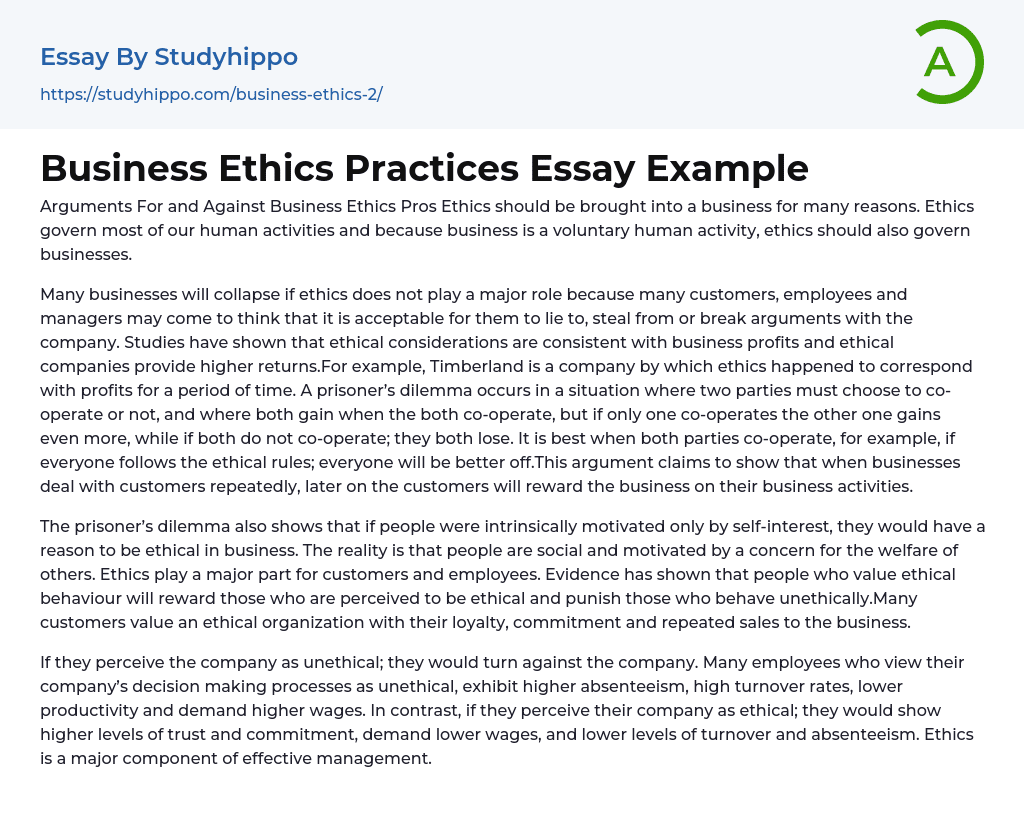The case for and against business ethics is centered on whether ethics should be incorporated into business operations. One argument in favor of this is that ethics guide most of our actions as humans, and since engaging in business is a voluntary human activity, it should also be governed by ethics.
If businesses do not prioritize ethics, they may face collapse as customers, employees, and managers will believe that lying, stealing, or breaking contracts is acceptable. Studies indicate a positive correlation between ethical business practices and profitability. For instance, Timberland experienced a period where ethics and profits aligned. The prisoner's dilemma arises when two parties must choose to cooperate or not; both benefit when they cooperate, but if only one cooperates, the other gains more, while if both refuse to cooperate, they both suffer. Cooperation is optimal; if everyone adheres to ethical standards,
...everyone benefits. This line of reasoning suggests that repeated interactions with customers incentivize ethical behavior for better business outcomes.
The prisoner's dilemma highlights that business ethics may have a role to play in situations where individuals are driven by self-interest. Despite this, people are innately social and often want to promote the well-being of others. For customers and employees, ethics are a significant factor. Research consistently demonstrates that individuals who prioritize ethical conduct reward behavior deemed ethical and punish those who act unethically. Thus, customers often show loyalty, commit, and return to do business with ethical organizations.
Effective management includes ethics as a major component. If employees see a company as unethical, they may turn against it and exhibit higher absenteeism, turnover rates, and demand higher wages. On the other hand, if they perceive
their company as ethical, they typically exhibit higher levels of trust and commitment, demand lower wages, and have lower levels of turnover and absenteeism.
- Values of Life essays
- Ethical dilemma essays
- Normative Ethics essays
- Virtue Ethics essays
- Belief essays
- Deontology essays
- Moral essays
- Virtue essays
- Work Ethic essays
- Board Of Directors essays
- Brand Management essays
- Business Ethics essays
- Business Management essays
- Change Management essays
- Comparative Analysis essays
- Decision Making essays
- Dispute Resolution essays
- Knowledge Management essays
- Leadership essays
- Leadership and Management essays
- Manager essays
- Operations Management essays
- Performance Management essays
- Product Management essays
- Project Management essays
- Quality Management essays
- Risk essays
- Risk Management essays
- Scientific Management essays
- Stress Management essays
- supply chain management essays
- Time Management essays
- Total Quality Management essays
- American Dream essays
- Barriers To Entry essays
- Capitalism essays
- Central Bank essays
- Compensation essays
- Consumerism essays
- Economic Development essays
- Economic Growth essays
- Economic Inequality essays
- Economic System essays
- Economy essays
- Employment essays
- Export essays
- Finance essays
- Free Trade essays
- Gross Domestic Product essays
- Human Development essays




